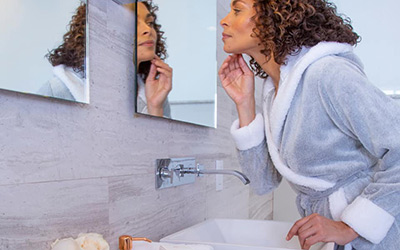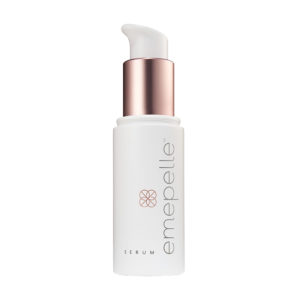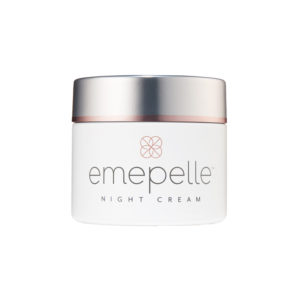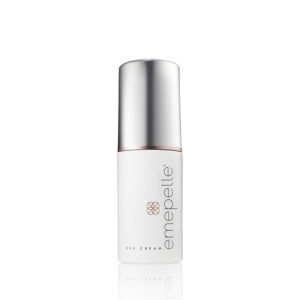If you’ve noticed your skin changing as you get older, you might think it’s just the aging process. After all, wrinkles, sagging, dryness, dullness—they’re all just part of getting older, right?
Of course, skin does change as we age. But if you’re a woman in your 40s or 50s, you might find that your skin—and your appearance—is changing much more suddenly than you expected. So, what’s really going on? Let’s take a closer look at how menopause affects the skin, and what women can do to address these new skincare concerns.
Two Types of Skin Aging
There are two main types of skin aging: extrinsic and intrinsic.
Extrinsic skin aging is a result of external factors that contribute to older-looking skin, such as sun exposure, smoking, diet or pollution. There are steps you can take to minimize these effects such as to always wear sunscreen and to ensure that your skincare regimen includes products that offer antioxidant protection.
On the other hand, intrinsic skin aging is a natural process that occurs as skin loses collagen over time. Collagen is a protein that serves as a major component of skin’s connective tissue, providing strength and flexibility. From the age of 20 until the time of menopause, we lose around 1% of collagen each year.
How Menopause Affects Skin Aging
During perimenopause and menopause, biological factors cause a healthy woman’s skin to age more rapidly than at any other stage of her life. Reduced levels of estrogen lead to dramatic collagen loss, which accelerates intrinsic skin aging. This condition is referred to as Estrogen Deficient Skin and leads to a number of menopause skin changes during menopause including dryness, dullness, more prominent wrinkles and a loss of plumpness.
Collagen Loss During Menopause
Estrogen plays a critical role in maintaining healthy, vibrant and youthful-looking skin. It works by activating key skin cells called fibroblasts and keratinocytes. In turn, these skin cells produce collagen, elastin and hyaluronic acid, all of which help maintain the skin’s youthful appearance.
Leading up to, during and after menopause, women’s estrogen levels will decline, which in turn causes a dramatic loss of collagen. In fact, low estrogen levels cause greater collagen loss than chronological aging.
During the first five years after the onset of menopause, Estrogen Deficient Skin leads to a drop in up to 30% of dermal collagen. After menopause, collagen continues to drop steadily at a rate of around 2.1% per year. This loss of collagen is the most significant cause of intrinsic skin aging in women.
How to Combat Extrinsic and Intrinsic Skin Aging
When you look in the mirror and notice sudden signs of aging, it can be an unwelcome surprise. Nobody wants to feel they’ve aged a decade in what feels like overnight. Luckily, there are steps women can take to improve the appearance of their skin and minimize menopause skin changes.
Switch Up Your Skincare
Most women find that after the start of menopause, the trusted products they’ve used for years are no longer suitable for their changing skin. To target the accelerated collagen loss caused by declining estrogen levels during menopause, you need a specialized product line created especially for menopausal skin.
Emepelle® is a breakthrough line of skincare products, developed especially for skin affected by perimenopause and menopause. Featuring revolutionary MEP Technology®, Emepelle is clinically proven to safely and effectively help address the root cause of accelerated skin aging brought on by Estrogen Deficient Skin, without the use of hormones.
Be Attentive to Your Health
In addition to using targeted skincare products, women wishing to combat the symptoms of Estrogen Deficient Skin should stay on top of their overall health. The following tips can help protect against disease as well as minimize skin aging:
- Continue using SPF every day. Wearing daily sun protection is essential to maintain skin health and to prevent premature skin aging. Therefore, always wear a facial sunscreen to protect your skin.
- Stay hydrated. Dehydration can contribute to older, tired-looking skin. Remember to sip water throughout the day to keep your skin plump and hydrated.
- Eat well. The food we eat plays a big role in the health of our skin. Supplements and foods that contain Omega-3 fatty acids, Vitamin C and Vitamin K are reported to help improve the appearance of skin.
- Exercise. Exercise is key to boosting your mental health and your energy, and research suggests that regular exercise may also slow the skin aging process. Staying active can go a long way in making you look and feel youthful.
- Sleep. You may have heard it’s important to get your “beauty rest,” but it’s not just a saying. A study in the journal Clinical and Experimental Dermatology found that people who slept seven to nine hours had more moisturized skin than those who slept five hours or fewer.
Learn More About How to Improve Your Skin’s Appearance
The effects of menopause on the skin can be frustrating for many women. Thankfully, there is now a way to address the root cause of intrinsic skin aging caused by perimenopause and menopause.
Emepelle is a non-hormonal treatment that combats signs of skin aging including dryness, wrinkling, dullness, and laxity. If you’re nearing or are in menopause and are concerned that your skin is aging at a rapid rate, Emepelle could be an ideal product line to introduce into your daily routine. Learn more about Emepelle’s line of products, including Empelle Eye Cream, and how they can help restore your skin’s appearance.




